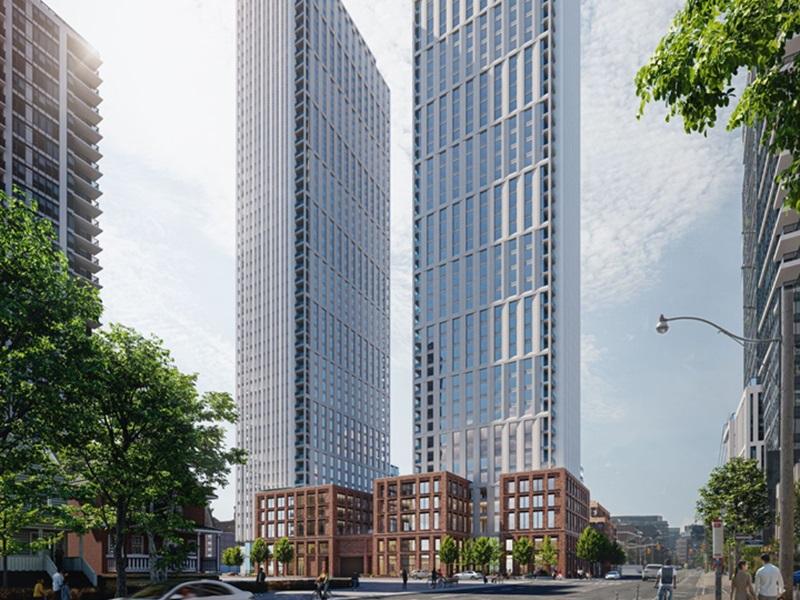
With the dust from the blast of WeWork's bankruptcy still hanging in the air, Vancouver office market insiders on Wednesday debated the potential fallout in Canada's West Coast market, which is already dealing with higher vacancy and demand challenges caused by work-from-home and a looming recession.
This week, the international co-working giant filed for Chapter 11 bankruptcy protection in the U.S. On Monday, WeWork entered into a restructuring support agreement with most of its stakeholders to reduce debt while further evaluating its leases, many of which will likely end.
On Wednesday, the Globe and Mail reported WeWork planned to shut four Canadian spaces in Toronto, Vancouver and Burnaby along with 65 other WeWork locations in New York, Boston and other U.S. cities. The report cited a Tuesday filing with the U.S. Bankruptcy Court for the District of New Jersey.
Office market stakeholders joined a panel at the Vancouver Strategy & Leasing Conference Wednesday to share their insights on the uncertain direction the office market is taking. The WeWork situation was a hot topic.
WeWork fallout likely to ‘play out in three ways’
The bankruptcy proceedings with WeWork will probably play out in three ways, said Luke Moran, vice-president, leasing with Peterson Real Estate.
WeWork will give back some of the space, renegotiate on some locations, perhaps keeping some — or others will step in and take over the operations with proven cashflow, Moran predicted. "But I think Vancouver is actually fairly healthy as it relates to WeWork."
Panelist Jeff Rank, senior vice-president, office and industrial with QuadReal Property Group, said the bankruptcy will likely create new holes in the Vancouver market. There will be “more vacancy that's going to hit us, whether it's 90 days from now, or whenever it will be, but it's coming our way.”
Rank added it’s possible that competing co-working companies, including Regus, could step in to absorb some of the vacated WeWork space. "That would be a great opportunity for someone like that to maybe step in at a deep discount."
WeWork had 614,400 square feet of office space in its nine locations in Burnaby and Vancouver, including the space it will be giving back, according to information provided to RENX by Ross Moore, senior vice-president and managing broker with Cresa in Vancouver.
Market conditions have improved for tenants
Overall, the local office market has been active, said panelist Glenn Gardner, principal with Avison Young.
“You've seen more tenants move around than I've ever seen in the past 17 years,” Gardner said. “It’s a pretty exciting time . . . maybe not to be the landlord of those buildings, but there are more opportunities.”
The market has gone through three distinct phases since 2019, the panelists agreed. In mid-2019 with vacancy around 2.5 per cent, “there wasn’t anywhere (for tenants) to move,” Moran said. “It was like a Tetris block.”
“That was the definition of unhealthy in my opinion,” Gardner added. “As a landlord, I’m sure it was good times.”
Then the pandemic ripped through the market and “nobody knew what to do,” Gardner said.
Office users had no sense of how much space they needed, where they would need it or how their workers would use their existing office footprints amid the work-from-home revolution.
Certainty is now returning, with more companies figuring out their work policies, whether it’s to be in the office full-time, or hybrid, or purely remote. “At least today people have made a decision,” Gardner said.
More sublease and head-lease options available
Vancouver’s overall office vacancy in the third quarter of this year reached 8.6 per cent, according to Colliers' National Market Snapshot Q3. It could climb higher as economic challenges start to manifest.
Panel host Matt Carlson, founder and executive managing partner with Floorspace, said his team recently crunched data on available spaces in downtown Vancouver. They included full-floor offices in the AAA, A and B classes.
The data showed 32 sublease options with average asking rates of $27.22 per square foot, and 100 head lease options with average asking rates of $41.21.
"So (that’s) a $14 difference just on the asking rate and three times as many (lease) options to choose from,” Carlson said.
The numbers suggest tenants in the market are enjoying plenty of opportunity to relocate, expand or find higher-quality office space as landlords face more competition from the sublease market.
"Someone's got 100 choices in our world . . . so we do have to be more flexible," Rank said, noting his company competes with other owners and managers to fill their buildings.
"From an institutional perspective, we're guarded on what our rates are, but in terms of the inducements and the flexibilities and all the things that we've done in the past, we're bringing those back again."
Full office-use picture remains unclear
Rank said many firms are now tracking percentage of actual occupancy in their buildings, meaning the percentage of leased space employees are actually using regularly.
“We have nothing to measure that against because nobody did that before the pandemic,” he said. “So, is 60 per cent occupancy in your office building . . . the way it's always been? Nobody knows.”
Gardner said one of his global clients realized it was spending all its in-office time on Zoom meetings and didn’t need 20,000 square feet. “Now, they need 5,000 square feet.”
Another client, however, has just mandated its entire team back to the office.
“They took a critical look at how much space they had and realized that you can't mandate people to come back to space you don't have, so that client actually expanded and took on more space. I think you're going to see a bit of both (sides).”
Insiders split over timing of next big office project
Opinions are mixed over when Vancouver could see its next major office tower. "My own personal prediction would be that we don't see (one start construction) in the next five years," Rank said.
Moran said it could be into the 2030s when Vancouver returns to 2019-like conditions in which demand dramatically outpaces supply.
"I don't think we'll get back to like a real difficult vacancy rate, (with) high occupancy clogging up the market and requiring a new build for probably five years."
Gardner felt it might be sooner, given that tenants have shown a willingness to relocate to high-quality office spaces.
"I think you're going to see someone . . . kick off a build in the next two to three years," Gardner said, adding companies looking for top-end offices sized 30,000-60,000 square feet have minimal options in downtown Vancouver, particularly with a view.
“I think there's going to be a tenant that either comes into our market or is in our market and wants to look at relocating out of their building, (and that) is probably going to kick off one of these buildings."










